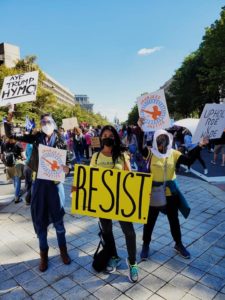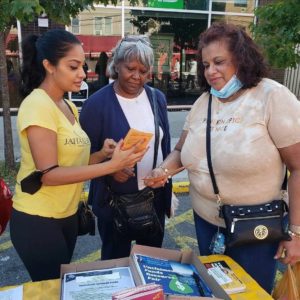Jahajee Sisters envisions a world where women, girls, and all people across the gender spectrum are safe, healthy, and joyful – unconstrained by the multiple oppressions that bind them today.
RISE Together Fund is committed to advancing the leadership, wellness, and resilience of women, queer and nonbinary movement organizers in our field. Women constitute 80% of our grantee executive directors, and are often the unsung heroes of our social movements. Since 2017, RISE Together Fund has funded resilience and leadership development resources for cohorts of women in our field.
 And throughout 2021, RISE Together Fund is featuring our field leaders’ gender justice activism, sharing their stories and successes, and lifting up their bold ideas for how we can achieve a thriving, inclusive democracy. We are pleased to continue this series by featuring Jahajee Sisters.
And throughout 2021, RISE Together Fund is featuring our field leaders’ gender justice activism, sharing their stories and successes, and lifting up their bold ideas for how we can achieve a thriving, inclusive democracy. We are pleased to continue this series by featuring Jahajee Sisters.
Founded in 2007, Jahajee Sisters is building the leadership of the women and nonbinary descendants of the Indo-Caribbean diaspora in Queens, New York, and is committed to rooting out patriarchal systems that continue to hold these communities back from liberation. Below is our conversation with Jahajee Sisters’ co-executive directors, Shivana Jorawar and Simone Jinghoor.
Why is gender justice a core component of your organizing model? How does it intersect across other issue areas?
There is a long legacy of sexual violence among Indo-Caribbeans, rooted in colonialism. When “low-caste” Indian ancestors were taken from India to be indentured servants on Caribbean sugar plantations, it was mostly men who made the journey. For many years, men outnumbered women 10 to 1, resulting in rampant sexual assault and violent fits of jealous rage. Through our work, we have seen the stigma around sexual and domestic violence be reduced. However, the violence endures.
The culture of sexual objectification is strong, evidenced by the shameless catcalls in our neighborhoods. Over the past three years, nearly a dozen survivors of child sexual assault have broken their silence to Jahajee Sisters. Many of them were abused by prominent community figures.
The intersectional gender justice work we do at Jahajee Sisters uproots systems of oppression that plague our isolated immigrant community. Ours is a community that has been impacted by racial and religious discrimination, especially post 9/11. As we build our organizing power, we are uplifting a marginalized racial group that makes up the third largest foreign-born population in New York City.
We are openly addressing class disparities and anti-Blackness in our work. This has started with us having courageous conversations with our membership and grew into courageous with our community. It is critical to heal through our own traumas and internalized white supremacy so we can work in larger movement spaces for collective liberation. We know gender justice can be accelerated through deep solidarity across identities, and by centering those most impacted.
What should funders know about why we need to center women and nonbinary leaders in our movements?
When we lift up a woman, we lift up a whole community! When women do not have the resources they need to thrive, this impacts the entire family and everyone connected to her. Women are very often the backbones of families and our larger community, taking on the responsibility of making sure people are fed and healthy. We are some of the ones closest to the problem, who live them every day, and know what it will take to overcome.
Is there a recent accomplishment or story that helps convey the impact of your gender justice work?
We have supported sexual assault survivors to heal through storytelling and deep-healing circles, and we held the very first sexual assault speakout in our community in 2019. One 14-year-old sister who participated in our Leadership & Empowerment Institute broke her silence for the first time during a circle with 15 of us. Her trauma had made her depressed, suicidal, reclusive, and impacted her cognitive abilities. She transformed through her time with us, and other sexual assault survivors in the institute came forward during that circle after she did. It was a powerful moment of solidarity and release – emblematic of the impact Jahajee Sisters has on people’s lives.
 Through your gender justice programming and all of your programming, what is the future you hope to build?
Through your gender justice programming and all of your programming, what is the future you hope to build?
Jahajee Sisters envisions a world where women, girls, and all people across the gender spectrum are safe, healthy, and joyful — unconstrained by the multiple oppressions that bind them today. We are a healing and political home for Indo-Caribbeans who have survived or are at risk for experiencing gender-based violence, and we organize with them to achieve gender justice. Our community of support guides survivors to heal, recover, and thrive. Through leadership development, grassroots organizing, and arts activism, we amplify community voices and visions to transform culture.
As we build our organizing power, we are uplifting a marginalized racial group that makes up the third largest foreign-born population in New York City.